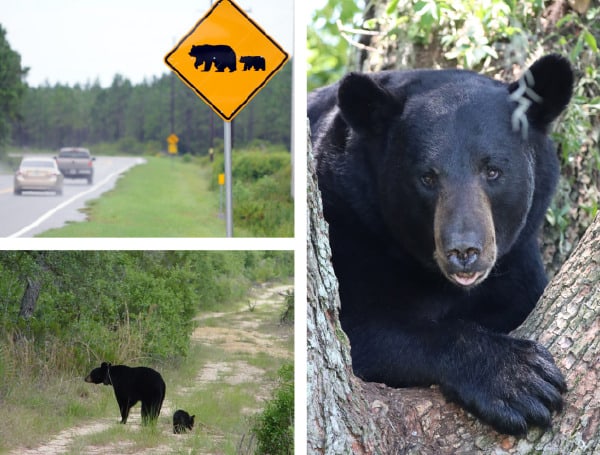Florida is home to a diverse array of wildlife, including the majestic Florida black bear. These fascinating creatures have captured the hearts and minds of residents and visitors alike.
However, living in close proximity to bears can present unique challenges.
In this comprehensive guide, we will delve into the world of Florida black bears, providing valuable insights on how to safely coexist with them.
From understanding their behavior to implementing effective strategies for bear-proofing your property, this article will equip you with the necessary knowledge to live harmoniously with these gentle giants.
The Florida Black Bear: An Iconic Species
The Florida black bear (Ursus americanus floridanus) is a subspecies of the American black bear, uniquely adapted to the diverse habitats of the Sunshine State.
These bears are known for their distinctive appearance, with a stocky build, a shiny black coat, and a slight white crescent-shaped mark on their chests. Adult males can weigh up to 350 pounds, while females typically range between 150 to 250 pounds.
Habitat and Distribution
Florida black bears can be found throughout the state, inhabiting a variety of ecosystems including forests, swamps, and hammocks.
They have a wide distribution, with populations present in both rural and urban areas. These bears are highly adaptable, capable of thriving in diverse environments.
Behavior and Characteristics
Florida black bears are primarily solitary animals, with males having larger home ranges than females. They are omnivorous, with their diet consisting of both plant matter and animal protein.
Bears are known to be opportunistic feeders, consuming berries, nuts, insects, and occasionally small mammals. It’s important to note that bears have an incredible sense of smell, which helps them locate food sources from miles away.
Read: Exploring The Diverse Wildlife Of Florida
Bear Communication
Bears communicate through a variety of visual and olfactory signals. They use body language, such as posturing and vocalizations, to convey their intentions and establish dominance.
Scent marking is another essential form of communication, with bears leaving behind scent trails to mark their territory and attract potential mates.
Bear Reproduction and Family Structure
Florida black bears typically breed between June and August, with cubs being born in January or February. Female bears, known as sows, give birth to one to four cubs, which they care for diligently.
Cubs remain with their mothers for approximately 18 months, learning essential survival skills before venturing out on their own.
Bear Hibernation
Unlike their counterparts in colder regions, Florida black bears do not enter a true state of hibernation. Instead, they undergo a period of torpor, during which their metabolic rate decreases, allowing them to conserve energy.
Bears may retreat to dens or construct temporary shelters to seek refuge during this period.
Bear-Proofing Your Property
Creating a bear-friendly environment begins with implementing effective deterrents to prevent bears from accessing food sources on your property.
Secure your garbage bins in bear-resistant containers, remove bird feeders during bear season, and avoid leaving pet food outside. Additionally, installing electric fencing around gardens and beehives can help deter bears from damaging these areas.
Bear Encounter Safety Tips
While bears are generally non-aggressive, it’s crucial to know how to react in the unlikely event of a bear encounter. Remember, bears are wild animals and should be treated with caution.
If you encounter a bear, stand your ground, speak calmly, and back away slowly. Avoid direct eye contact and never run, as this may trigger a chase response.
Educating Your Community
Promoting bear awareness within your community is essential for fostering a culture of coexistence. Organize educational workshops, distribute informational brochures, and collaborate with local authorities to implement bear-aware policies.
By working together, we can create a safe and sustainable environment for both humans and bears.
Reporting Bear Incidents
If you encounter a bear that poses an immediate threat to human safety or causes property damage, it’s crucial to report the incident to the Florida Fish and Wildlife Conservation Commission (FWC).
They have dedicated programs in place to assess and address bear-related issues promptly.
Conservation Efforts and Initiatives
The conservation of Florida black bears is of utmost importance to maintain a healthy ecosystem.
The FWC, in collaboration with various organizations and local communities, actively works towards preserving bear habitats, conducting research, and implementing management strategies to ensure the long-term survival of these magnificent creatures.
Living in harmony with Florida black bears is not only possible but also essential for the preservation of our natural heritage.
By understanding their behavior, implementing bear-proofing measures, and promoting bear awareness within our communities, we can create a future where humans and bears coexist peacefully.
Together, let’s embrace the beauty and wonder of these remarkable creatures and ensure their conservation for generations to come.
Android Users, Click To Download The Free Press App And Never Miss A Story. Follow Us On Facebook and Twitter. Sign up for our free newsletter.
We can’t do this without your help. Visit our GiveSendGo page and donate any dollar amount; every penny helps.


